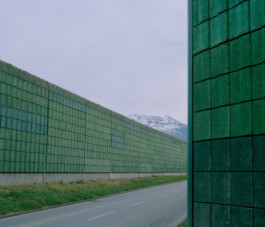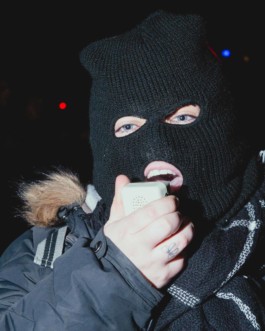While We Wait
Moria, the biggest refugee camp on Lesbos, was designed to house a maximum of 3.000 people. Today* more than 15.000 refugees live in the camp, and the number keeps rising. Many stay in the camp for up to a year, while they wait for their asylum cases to be handled by the authorities.
How do you spend your time and make sense of a temporary place like a refugee camp?
*note: this project was made in 2019, before the camp burned down.
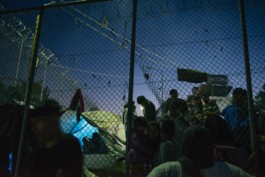
This hole in the fence is one of the main connections between the official refugee camp Moria, and the surrounding olive grove known as The Jungle, where most of Moria's inhabitants live. Inside the fence people find most of the things they need on a day-to-day basis. This is where they line up for daily rations, and where they can connect with different NGO's helping with things ranging from legal help to distribution of blankets and tents.
On an empty parking lot a couple hundred meters from Moria, five football games a played simultaneously. A drama is unfolding on the bleachers of the Renault, after a rough tackle sends one of the Afghan players to the ground. Around 70% of Moria is populated by Afghani residents, while the remaining 30% is a mix of multiple other ethnicities. Other camps mix ethnicities differently. This division is an attempt at minimising tensions between nationalities.
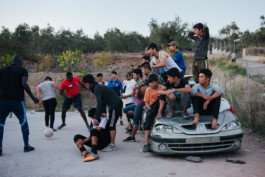
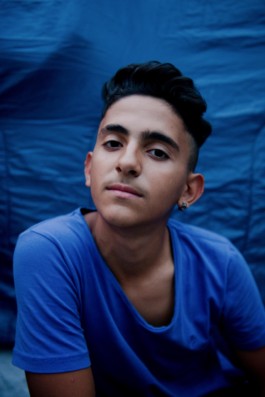
Mahdi, 16 years old.
This is not Mahdi's first journey from Iran to Europe. A couple of years ago he and his mother made it to Germany and lived there for six years. But after a divorce, his mother brought him and the family back to Iran. She remarried and disappeared. Now Mahdi's trying to make it back to Germany with his grandmother and little brother. He'd like to teach German in the refugee camp and go to school himself. It becomes a challenge though, as he often has to stay back to watch the tent. Many in the camp are worried about having their possessions stolen, as there is no backup.
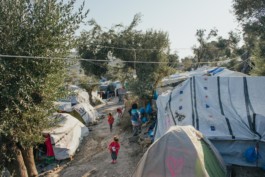
Extension chords hang like cobwebs from the canopies of olive trees in an attempt to provide everyone in the outer camp with electricity. This is The Jungle, as its inhabitants call it. Moria is filled far over capacity. That means that refugees resort to pitching tents in the olive grove surrounding the walls of Moria. Every day The Jungle expands slightly.
Being a refugee doesn't make you lose your sense of fashion or vanity. Barbershops and hairdressers dot the camp every fifty meters or so in every direction. Some accommodate their clients with luxuries like extension chords for charging their phones, hung on the barbed wire fence, and mirrors for checking out their new hairstyle. Others keep with the bare necessities. And if your don't have a hairbrush, another brush will do.
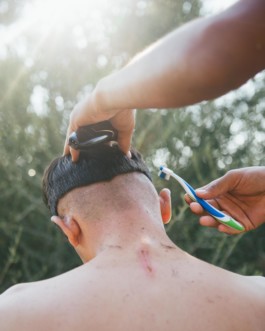
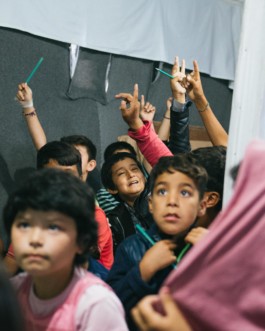
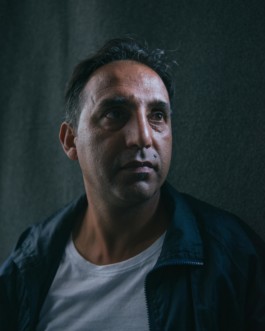
Zekria Farzad (pictured on the right) arrived in Moria four months ago. Schooling options were very limited at the time, so Farzad decided to start teaching in the shade of the olive grove. He believes it's important to keep yourself busy in the camp in order to not get in a rot. The educational undertaking kept developing. Farzad assembled a group to help build a school out of tarp and pallets. Today the school, run by their NGO A Wave Of Hope For The Future, has 800 students and is in session from 8am to 10pm. They teach English, German and Greek, to prepare students for their new lives in Europe. They have art classes as well.
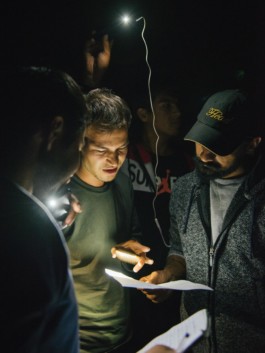
Students discuss their homework for English class with their teacher Sami. His classes are run with an iron fist, but rather than scaring them away, it motivates his students to work with purpose. They're the only class hanging around after class is done. In just two months four of his students have progressed far enough to work as translators at different NGOs. Sami himself has professed, that doing this work is keeping him sane. When his day is filled with work for the school and other NGOs, the reality of living in a refugee camp is kept at bay.
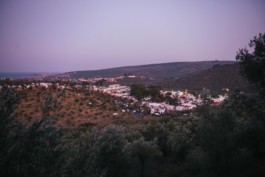
Moria seen from its surrounding hills. The tents in the foreground are known as Down Jungle as opposed to Up Jungle, the least and most densely populated areas of The Jungle. Down Jungle emerged in the last couple of months, due to a rise in refugees arriving in Lesbos.
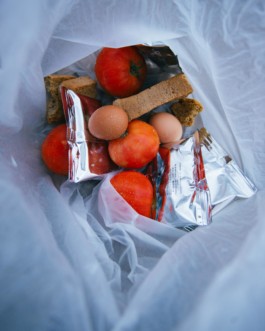
The influx of refugees in Lesbos has increased the wait for financial emergency aid. That has made many Moria residents dependant on the military rations that are distributed thrice a day in the inner camp. This plastic bag contains dinner for two adults and two children.
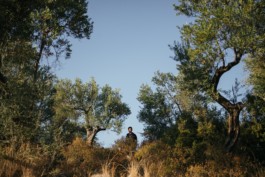
Qais is 16 years old. He's made his way from Afghanistan to Greece on his own. He arrived in Lesbos two months ago. The section for unaccompanied minors is fully occupied, so he sleeps in the street. He still checks in daily for the three daily meals the camp provides him. Qais has a brother in Sweden, but is anxious to move on. He'd likely have to wait in the camp for a year to reunite with his brother. Either way, he'd rather go to England. That's why he's planning to go onto the Greek mainland and make his way there on his own. He wants to pass through Italy so he can meet Ronaldo in Juventus, and go through Paris to see the Eiffel Tower. He's heard people fall in love under the Eiffel Tower.
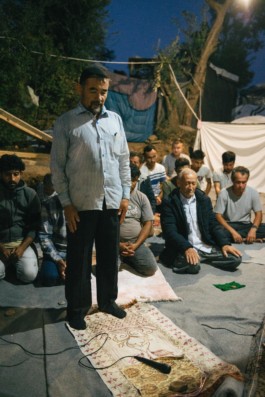
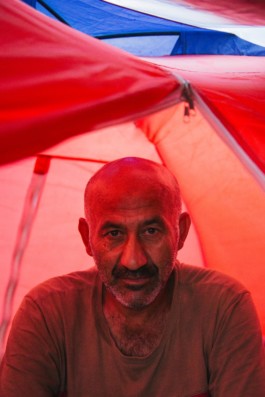
Evening prayer is in session at the building site in the olive grove. Farzad's school is expanding to accommodate the rising number of students. The new addition will serve both as a mosque and space for different workshops. Like the old building, it will be made from pallets and tarp.
Mohammad lives in the tent next to the new addition. This is where he spends most of his day, most days. He's sick and getting the necessary medicine from the volunteer doctors' limited supply isn't easy.
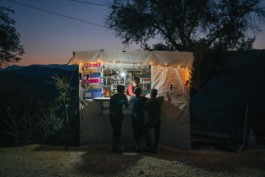
Those looking to make an extra buck have set up kiosks, which aren't strictly allowed, but they are tolerated. Others have started barbershops and bakeries, and bus-ticket salesmen get to keep 20 cents from every ticket they sell.
While
We
Wait
Moria, the biggest refugee camp on Lesbos, was designed to house a maximum of 3.000 people. Today* more than 15.000 refugees live in the camp, and the number keeps rising. Many stay in the camp for up to a year, while they wait for their asylum cases to be handled by the authorities.
How do you spend your time and make sense of a temporary place like a refugee camp?
*note: this project was made in 2019, before the camp burned down.

This hole in the fence is one of the main connections between the official refugee camp Moria, and the surrounding olive grove known as The Jungle, where most of Moria's inhabitants live. Inside the fence people find most of the things they need on a day-to-day basis. This is where they line up for daily rations, and where they can connect with different NGO's helping with things ranging from legal help to distribution of blankets and tents.

On an empty parking lot a couple hundred meters from Moria, five football games a played simultaneously. A drama is unfolding on the bleachers of the Renault, after a rough tackle sends one of the Afghan players to the ground. Around 70% of Moria is populated by Afghani residents, while the remaining 30% is a mix of multiple other ethnicities. Other camps mix ethnicities differently. This division is an attempt at minimising tensions between nationalities.

Mahdi, 16 years old.
This is not Mahdi's first journey from Iran to Europe. A couple of years ago he and his mother made it to Germany and lived there for six years. But after a divorce, his mother brought him and the family back to Iran. She remarried and disappeared. Now Mahdi's trying to make it back to Germany with his grandmother and little brother. He'd like to teach German in the refugee camp and go to school himself. It becomes a challenge though, as he often has to stay back to watch the tent. Many in the camp are worried about having their possessions stolen, as there is no backup.

Extension chords hang like cobwebs from the canopies of olive trees in an attempt to provide everyone in the outer camp with electricity. This is The Jungle, as its inhabitants call it. Moria is filled far over capacity. That means that refugees resort to pitching tents in the olive grove surrounding the walls of Moria. Every day The Jungle expands slightly.

Being a refugee doesn't make you lose your sense of fashion or vanity. Barbershops and hairdressers dot the camp every fifty meters or so in every direction. Some accommodate their clients with luxuries like extension chords for charging their phones, hung on the barbed wire fence, and mirrors for checking out their new hairstyle. Others keep with the bare necessities. And if your don't have a hairbrush, another brush will do.


Zekria Farzad (pictured on the right) arrived in Moria four months ago. Schooling options were very limited at the time, so Farzad decided to start teaching in the shade of the olive grove. He believes it's important to keep yourself busy in the camp in order to not get in a rot. The educational undertaking kept developing. Farzad assembled a group to help build a school out of tarp and pallets. Today the school, run by their NGO A Wave Of Hope For The Future, has 800 students and is in session from 8am to 10pm. They teach English, German and Greek, to prepare students for their new lives in Europe. They have art classes as well.

Students discuss their homework for English class with their teacher Sami. His classes are run with an iron fist, but rather than scaring them away, it motivates his students to work with purpose. They're the only class hanging around after class is done. In just two months four of his students have progressed far enough to work as translators at different NGOs. Sami himself has professed, that doing this work is keeping him sane. When his day is filled with work for the school and other NGOs, the reality of living in a refugee camp is kept at bay.

Moria seen from its surrounding hills. The tents in the foreground are known as Down Jungle as opposed to Up Jungle, the least and most densely populated areas of The Jungle. Down Jungle emerged in the last couple of months, due to a rise in refugees arriving in Lesbos.

The influx of refugees in Lesbos has increased the wait for financial emergency aid. That has made many Moria residents dependant on the military rations that are distributed thrice a day in the inner camp. This plastic bag contains dinner for two adults and two children.

Qais is 16 years old. He's made his way from Afghanistan to Greece on his own. He arrived in Lesbos two months ago. The section for unaccompanied minors is fully occupied, so he sleeps in the street. He still checks in daily for the three daily meals the camp provides him. Qais has a brother in Sweden, but is anxious to move on. He'd likely have to wait in the camp for a year to reunite with his brother. Either way, he'd rather go to England. That's why he's planning to go onto the Greek mainland and make his way there on his own. He wants to pass through Italy so he can meet Ronaldo in Juventus, and go through Paris to see the Eiffel Tower. He's heard people fall in love under the Eiffel Tower.

Evening prayer is in session at the building site in the olive grove. Farzad's school is expanding to accommodate the rising number of students. The new addition will serve both as a mosque and space for different workshops. Like the old building, it will be made from pallets and tarp.

Mohammad lives in the tent next to the new addition. This is where he spends most of his day, most days. He's sick and getting the necessary medicine from the volunteer doctors' limited supply isn't easy.

Those looking to make an extra buck have set up kiosks, which aren't strictly allowed, but they are tolerated. Others have started barbershops and bakeries, and bus-ticket salesmen get to keep 20 cents from every ticket they sell.
Scroll to top
